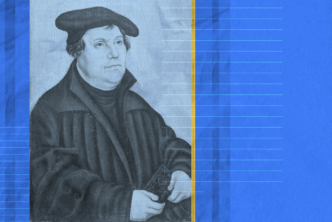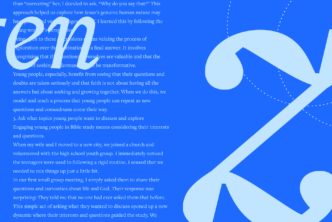There are many available postures in the fraught North-American discussion of race and ethnicity. They’re all visible on Twitter—sorrow, anger, resignation, indignation, sarcastic dismissal. I’m not saying these are all wrong; in my mind, each may be called for at various times (even the last one; see 1 Kings 18:27). But what so impressed me about McCaulley—in our talk and in his book—was that he took a posture of submission to God’s word. In McCaulley I see the humility of a person who is doing as James bluntly instructs: “submit to God” (Jas 4:7).
McCaulley told me that Reading While Black: African American Biblical Interpretation as an Exercise in Hope (which was Christianity Today’s 2021 Beautiful Orthodoxy Book of the Year), was born when he saw that “a lot of people who are caring about issues of racism and injustice are doing so based upon a theological foundation that … was rooted in a rejection of biblical text.” They were not submitting to Christ: “They were the authority. … Their idea was that you … can’t be committed to the authority of the Scripture and care about [justice].” McCaulley told me that his work is “a subtle apologetic for the ongoing normative role of the Scriptures, inspired by the lives of black and brown people in America.”
McCaulley’s book isn’t just about the normative role of the Bible; it actually submits its pages and arguments to the norms of Scripture. His book offers intelligent insight, using the tools of evangelical academic biblical studies, into the ways in which the Bible speaks to the experience of Black Christians. (Hang on for a few of those Bible insights.)
Audiences for Reading While Black
McCaulley sees at least two major audiences for his book.
First, “there are a lot of African American Christians,” he says, “who are asking the question: Is the God I encounter in the Bible a friend or an enemy when it comes to injustice?” To this audience McCaulley says: “The Bible, as written, has good news for Christians who care about these things. It’s okay to care about injustice and care about poverty, care about racism, and trust the Scriptures. It’s okay to actually affirm your ethnic identity as a created good and have interest in the Scriptures.”
The second audience is the whole Christian world, McCaulley says. And it has struck a chord” there because “the book is ultimately contending for hope”—and because “I don’t think they like it when black expressions of faith are closed off from the rest of the body of Christ.” Christians from the African-American church and Christians from outside it “read the same Bible and are drawn to the same Jesus.” So one of McCaulley’s major goals in his book is to acquaint readers with the “Black ecclesial tradition” in which he grew up.
It’s not as if one’s social location determines one’s reading of Scripture; it’s that cultural and family backgrounds can bring readers to complementary insights on the one Word. “Here’s how my experiences and African American helps me understand the Bible,” says McCaulley; “but this interpretation that I’m offering to you is accessible to everyone.” His book is “an exegetical offering from the black church to the wider world.”
McCaulley actually predicts that Western Christians from outside the black church will come to see more value in the black ecclesial tradition over time. “One of the things that makes the African American Christian tradition so unique is that we’ve had to make sense of Jesus in the context of a culture that often disappointed us,” he says. And outside the black church, there is now “a generation of younger evangelicals who are struggling with a culture (or a Christianity) that disappoints them.” Reading While Black can help them ask how they can be faithful Christians in such a situation.
Reading While Black is fundamentally, McCaulley says, a book of hope. “There’s a lot of affection that permeates the book,” he says. “It’s a love letter to the Bible. … Most of the book is just biblical interpretation.”
For example, McCaulley highlights a key point in the biblical narrative, the passage in Genesis 12 in which “God made a promise to Abraham to bring the nations into his family.” He asks, “What does this actually mean for how we think about the church today?” He answers: “God’s vision for his people was never limited to one ethnic group, culture, or nation. His plan was to bless the world through Abraham’s descendants.”
Discussion of Genesis 12 wasn’t part of his original plan for the book; McCaulley originally attempted to write a book focusing only on the New Testament (he is a New Testament scholar). But he found he couldn’t. He had to appeal to the whole of God’s word.
“Insomuch as Christianity takes its bearing from the Old Testament,” he writes in the book, “the global nature of Abraham’s vision proves lie to any claim that the Messiah Jesus, the ultimate heir of Abraham (Mt 1:1; Gal 3:16), belongs only to Europe.”
His overall posture of submission to the Word allows him to handle delicate topics with biblical fidelity. He argues carefully for points that, sadly, have not been clear to all Bible interpreters. For example, he discusses the famous “curse of Ham” in Genesis 9. He concludes that “No reasonable reading of Genesis could maintain (1) Canaan was the ancestors of all Africans; (2) the curse was black skin; (3) the point of Genesis was to substantiate European dominance over African peoples.”
I recently read Mark Noll’s The Civil War as Theological Crisis. It was jarring and dispiriting to see professing Christians from the 19th century defending race-based chattel slavery by appealing to Scripture. To be sure, sound scriptural answers were given to those arguments. But some of them have still not been put to rest. McCaulley, for example, wades into a long-standing dispute over the extent of obedience to government required by the opening paragraphs of Romans 13. Did Paul intend for all Christian people everywhere to docilely submit to government injustice?
McCaulley says no, and to do so he offers a careful argument appealing to all of Scripture. I urge you to slow down and process this (and then get the book and read the argument in greater detail):
I suggest that Paul’s words about submission to governing authorities must be read in light of four realities: (1) Paul’s use of Pharaoh in Romans as an example of God removing authorities through human agents shows that his prohibition against resistance is not absolute; (2) the wider Old Testament testifies to God’s use of human agents to take down corrupt governments; (3) in light of the first two propositions, we can affirm that God is active through human beings even when we can’t discern the exact role we play; (4) therefore, Paul’s words should be seen as more of a limit on our discernment than on God’s activities.
This isn’t the kind of appeal to Scripture you get in the “Christian Self Help” section of airport bookstores. McCaulley works to be accessible, but he also expects readers to do some Bible study work.
Reading the Bible from a social location
When, quite a few years ago, I began to hear that “Bible interpretation from the margins” ought to be part of my Bible study, I was both excited and fearful. I was more than ready to learn from people who encounter the Bible in cultural situations very different from my own. Paul himself prepared me for this as he worked carefully in Acts, Romans, Galatians, and elsewhere through Jew-Gentile tensions in the church. But I was a bit afraid: will insights from culturally dissimilar Bible readers overturn my understandings of Scripture?
My reading of books like McCaulley’s—and like Plain Theology for Plain People, written by early 20th-century African American pastor Charles Octavius Boothe—showed me the truth of what McCaulley told me in our conversation: “Every tradition emphasizes certain things and downplays other things. And traditions actually have strengths and weaknesses.” But what I saw in these books was not radically dissimilar from what my own tradition has taught me. To reach to the Black ecclesial tradition for insight is no different than looking to, say, Scottish theology.
“Social location can put us in a certain posture and see things that are there [in the Bible],” says McCaulley. “And sometimes social location can cause us to miss things that are there.” He adds that there “is no social location that’s always the best spot at every point”—not the Black ecclesial tradition, not any other on offer. So “having a wide community of interpreters” throughout time and space and social location makes it possible for “people [to] make up for each other’s blind spots.” McCaulley says this is merely “the old idea of the priesthood of all believers.”
A posture of submission to the Lord of the Word—the Lord who told us that he would give his Spirit to people “from every tribe and language and people and nation” (Rev 5:9 CSB)—means taking a posture of willingness to learn from brothers and sisters who come from different spots on the cultural spectrum. Reading While Black isn’t the only way to read Scripture, but it helped this writer attain a posture of instruction, submission, and hope.

***
This article was originally published in the July/August 2021 issue of Bible Study Magazine. Slight adjustments, such as title and subheadings, may be the addition of an editor.
Related articles
- Trinity or Triarchy? Is There Authority and Submission in the Godhead?
- 39 Uplifting Bible Verses about True, Enduring Hope
- How to Do In-Depth Study of God’s Word (3 Steps)
Related resources
Reading While Black: African American Biblical Interpretation as an Exercise in Hope
Regular price: $17.99
Mobile Ed: BI101 Introducing Biblical Interpretation: Contexts and Resources (5 hour course)
Regular price: $189.99




